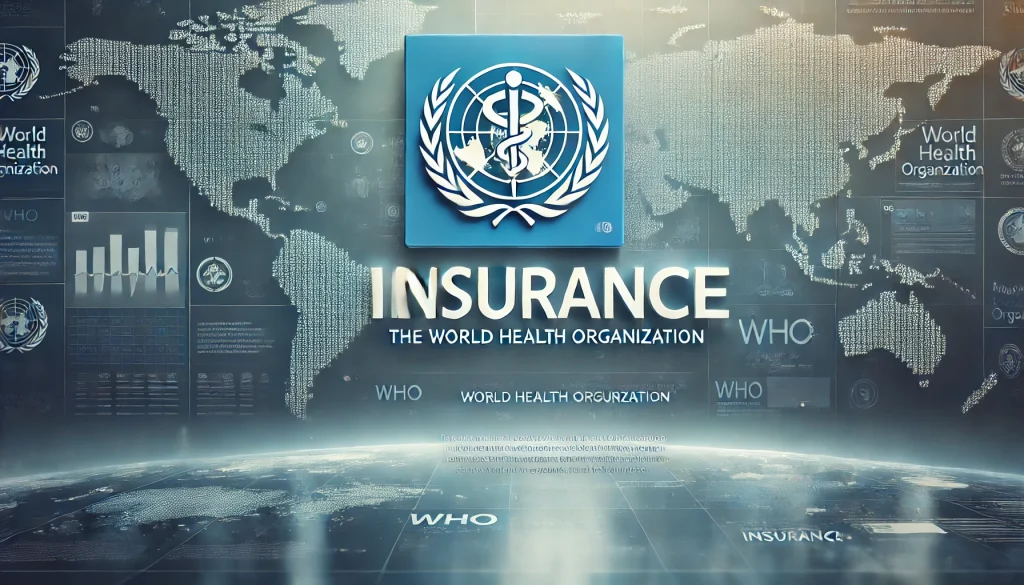The World Health Organization, or WHO, is well-known for its efforts to protect and improve global health. WHO Insurance plays a major role in fighting disease, providing health resources, and educating people about how to stay healthy. But did you know WHO also has a role in supporting insurance programs that help protect people from unexpected medical expenses? In this article, we’ll explore WHO’s work in health insurance, how it benefits people in different countries, and what it offers in terms of health protection.
What Is WHO Insurance?
WHO itself does not directly offer health insurance plans to individuals. Instead, WHO works with governments and health organizations worldwide to create affordable and accessible health insurance options. Through its support, WHO helps countries develop and strengthen their health systems, making sure people have financial protection when they need healthcare. Learn more about WHO’s health insurance initiatives here.
Why Is WHO Involved in Health Insurance?
The cost of medical care can be a major burden for families, especially in countries where health services are not easily accessible or affordable. WHO’s goal is to support universal health coverage (UHC), which means that everyone, everywhere, can get the healthcare they need without financial hardship. WHO helps countries create insurance systems so people don’t have to pay too much out of their pockets when they fall sick. By supporting health insurance, WHO helps make healthcare more affordable and accessible for everyone.
How WHO Insurance Programs Work
Although WHO does not directly sell insurance plans, it plays a big part in the design and support of health insurance programs around the world. WHO gives countries advice on how to set up these programs, helps them find funding, and provides tools for managing health insurance. WHO works with governments to ensure that people, especially those in low-income countries, have health insurance options to cover hospital visits, medicines, and preventive care.
For example, WHO has helped create insurance programs in countries in Africa, Asia, and Latin America, allowing people in these regions to access healthcare without facing huge medical bills. See WHO’s work on healthcare systems worldwide.
Key Benefits of WHO Insurance Programs
There are many benefits to the health insurance programs that WHO supports:
- Financial Protection: WHO-supported insurance programs help protect people from high medical costs, especially when dealing with serious illnesses.
- Access to Quality Care: By supporting health insurance, WHO helps people access good-quality healthcare services like hospitals, clinics, and pharmacies.
- Focus on Preventive Care: WHO encourages health insurance plans to include preventive care like vaccines and check-ups. This helps prevent diseases before they become serious.
- Inclusive Health Coverage: WHO aims to cover everyone, especially the poor and vulnerable, so that no one is left without access to essential health services.
These benefits make WHO-supported insurance programs a valuable resource for people around the world, especially those in areas with limited healthcare access.
Types of Health Insurance Programs Supported by WHO
WHO’s support for health insurance comes in many forms, depending on the needs of each country. Here are some examples of the types of health insurance programs WHO supports:
- National Health Insurance Programs
- In many countries, WHO works with the government to set up national health insurance programs. These programs are often funded by taxes, making them available to everyone in the country. National health insurance often covers basic health services like hospital visits, maternity care, and medicines.
- Example: Ghana’s National Health Insurance Scheme (NHIS) is supported by WHO to provide affordable healthcare to the people of Ghana. Learn more about Ghana’s NHIS.
- Community-Based Health Insurance
- Community-based insurance programs are run by small communities and funded by local contributions. These programs are especially helpful in rural areas, where people may not have access to national programs. WHO supports these programs to make sure they are fair and accessible.
- Example: In Rwanda, WHO has helped set up community-based insurance programs that allow rural families to access healthcare services without facing high costs. Read more about community health insurance in Rwanda.
- Employer-Based Health Insurance
- In some countries, WHO works with employers to offer health insurance plans for their workers. This type of insurance is often provided through a company or organization and helps cover medical costs for employees.
- Example: In the Philippines, WHO supports employer-based health insurance that helps workers and their families afford healthcare. Learn about employer-based insurance in the Philippines.
Costs of WHO-Supported Insurance Programs

The cost of WHO-supported insurance programs can vary a lot depending on the country, the coverage, and the type of insurance. Here are some general price ranges for WHO-supported insurance programs in different countries:
- National Health Insurance Programs
- Ghana: The NHIS in Ghana costs around GHS 30-50 per year (USD $5-8) for adults, with discounts for children and the elderly. Explore Ghana’s NHIS pricing.
- Philippines: PhilHealth costs depend on the member’s income level, ranging from PHP 2,400 to PHP 10,800 per year (USD $43-190) for self-employed individuals. Check out PhilHealth’s pricing here.
- Community-Based Health Insurance
- Rwanda: In Rwanda, community-based insurance costs around RWF 3,000 to RWF 7,000 per year (USD $2.50-6) per person. This covers essential healthcare needs, including doctor visits and hospital stays. Find more about Rwanda’s health insurance pricing.
- Senegal: Community-based health insurance in Senegal costs around CFA 4,000-5,000 (USD $7-9) per year and covers basic healthcare services. Learn about community insurance in Senegal.
- Employer-Based Health Insurance
- Thailand: In Thailand, employer-based insurance programs cost around THB 500-1,500 per month (USD $15-45), often covering employees and their immediate families. Read about employer health insurance in Thailand.
- Vietnam: Employer-based insurance costs in Vietnam are shared between employees and employers, typically costing around VND 500,000-1,000,000 per month (USD $22-44). Learn more about health insurance in Vietnam.
WHO Insurance Programs in Action: Real-Life Examples
WHO has supported health insurance programs in various countries with great success. Let’s look at a few examples to see how these programs are making a difference:
Ghana’s National Health Insurance Scheme (NHIS)
With WHO’s help, Ghana established the NHIS, which provides affordable healthcare for millions of Ghanaians. Through this program, people have access to medical treatments, medicines, and even maternity care without paying huge out-of-pocket costs. Many rural families, who previously couldn’t afford healthcare, are now able to access essential services. Learn more about Ghana’s NHIS.
PhilHealth in the Philippines
PhilHealth, supported by WHO, offers health insurance to workers, students, and retirees in the Philippines. This program helps cover hospital costs, medicines, and even preventive care. The program is funded through contributions from employers and employees, which helps make healthcare affordable and accessible for more Filipinos. Explore more on PhilHealth’s impact.
Community-Based Health Insurance in Rwanda
In Rwanda, WHO’s support for community-based insurance programs has made healthcare accessible to people in remote areas. By pooling contributions from community members, families in Rwanda can access basic healthcare without high fees, leading to healthier communities overall. Find out about Rwanda’s health insurance.
Why WHO Insurance Programs Are Important
WHO-supported insurance programs are essential because they give people access to healthcare, regardless of their income. These programs also reduce the number of people who fall into poverty due to medical costs, a common issue in countries without strong healthcare systems. By supporting health insurance, WHO works to create a healthier world where everyone has access to medical services and preventive care.
For more on why health insurance matters, visit WHO’s guide on universal health coverage.
How WHO Insurance Programs Benefit the Economy

When people have health insurance, they’re more likely to visit doctors regularly, get preventive care, and address health issues early on. This not only improves individual health but also benefits the economy. Here’s how:
- Reduced Financial Burden on Families: With health insurance, families spend less on medical bills. This allows them to use their money on other essential needs, like food, education, and housing, improving their overall quality of life.
- Increased Productivity: When people are healthy, they’re able to work, study, and contribute to their communities. Healthy people miss fewer days of work and are more productive, which boosts the economy and helps communities grow.
- Lower Government Spending: When more people have health insurance, governments spend less on emergency health services. Instead, they can focus on improving public health, building hospitals, and training healthcare workers. Learn more about WHO’s health policies and economic impact.
- Healthier Future Generations: Insurance programs encourage preventive care, like vaccines and check-ups, which keeps people healthier in the long run. This approach leads to a healthier, more resilient population over time.
WHO’s Role in Health Insurance During Emergencies
WHO’s support for insurance systems becomes especially important during health crises. In times of epidemics, pandemics, or natural disasters, people need access to healthcare quickly and at low cost. WHO helps countries adapt their insurance programs to cover emergency care, vaccination, and treatments during outbreaks. Here are some examples of how WHO-supported insurance programs respond during emergencies:
- Pandemic Response: During the COVID-19 pandemic, WHO advised countries to include COVID-19 testing, treatment, and vaccination in their health insurance plans. This reduced the financial burden on families and allowed more people to get vaccinated quickly.
- Natural Disasters: In countries prone to hurricanes, earthquakes, and floods, WHO assists insurance programs in covering injuries and treatments that result from these events. This helps people recover faster and reduces strain on the healthcare system.
- Outbreak Control: For diseases like Ebola, Marburg virus, or Zika, WHO collaborates with health insurance providers to make treatments accessible. This helps control the spread of these diseases by ensuring affected individuals can access the care they need without worrying about cost. See WHO’s work on epidemic response.
The Future of WHO-Supported Health Insurance Programs
As healthcare costs continue to rise, WHO is working on new ways to make health insurance affordable and accessible in every part of the world. WHO is currently researching innovative insurance models, such as:
- Digital Health Insurance Systems: Using digital technology, WHO is helping countries develop systems that allow people to register and manage their health insurance through mobile phones or online platforms. This is especially useful in rural areas, where accessing insurance offices might be difficult.
- Expanding Preventive Care Coverage: WHO is also encouraging insurance programs to expand their focus on preventive care, which can help reduce long-term medical costs. By including services like annual check-ups, mental health support, and wellness programs, insurance can help people stay healthy.
- Cross-Border Health Insurance: For people who live near borders or frequently travel between countries, WHO is exploring the idea of cross-border health insurance. This would allow individuals to access healthcare in multiple countries, providing better protection for migrant workers, students, and frequent travelers.
- Community Health Workers: WHO is also investing in training community health workers who can provide basic healthcare in remote areas. Insurance programs can cover the costs of these workers, ensuring that even the most isolated communities receive healthcare. Learn more about WHO’s vision for healthcare.
How You Can Support WHO’s Health Insurance Efforts
Supporting WHO’s work in health insurance can make a big difference, even at an individual level. Here are some ways to contribute:
- Stay Informed: Learn about WHO’s work in global health and the importance of health insurance in developing countries. Sharing this knowledge with others can raise awareness about the need for universal health coverage.
- Advocate for Health Coverage: Support policies that aim for universal health coverage in your country. This can help ensure that health insurance programs are strengthened and that no one is left behind. Learn about WHO’s goals for universal health coverage.
- Donate to Health Programs: Many global health organizations, including WHO, accept donations to fund their health insurance programs and initiatives in low-income countries.
Conclusion: WHO’s Impact on Global Health Insurance
In summary, WHO plays a crucial role in supporting health insurance systems worldwide, working to ensure that everyone has access to affordable healthcare. By partnering with governments, health organizations, and communities, WHO helps create insurance programs that protect people from high medical costs, improve access to quality care, and promote preventive health. Through these efforts, WHO is bringing the world closer to universal health coverage (UHC), which aims to leave no one without access to essential healthcare.
As healthcare needs grow and change, WHO’s work in supporting health insurance becomes even more essential. By reducing the financial burden of medical expenses, encouraging preventive care, and responding to emergencies, WHO-supported insurance programs are helping millions of people live healthier, more secure lives. Together, these efforts not only improve health outcomes but also build a stronger, more resilient future for communities around the world.
For more information on WHO’s initiatives and how you can support the journey toward universal health coverage, visit WHO’s official page on UHC.

